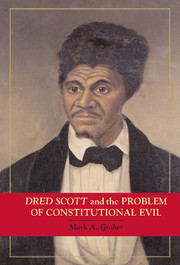PART THREE - COMPROMISING WITH EVIL
Published online by Cambridge University Press: 05 June 2012
Summary
Abraham Lincoln dramatically changed his public challenge to the Dred Scott decision after being elected president. Lincoln as senatorial and presidential candidate condemned on moral, historical, and aspirational grounds the judicial ruling that the federal government lacked constitutional power to ban human bondage in the territories. His speeches from 1856 until the spring of 1860 repeatedly asserted that slavery was evil, that the persons responsible for the Constitution recognized that slavery was evil, that those framers attempted to place slavery on “the course of ultimate extinction,” and that Congress was constitutionally empowered to ban slavery in any territory where human bondage was not previously legal. Immediately after the election of 1860, he ceased making these public attacks on the Taney Court and the Democratic Party. The last public address Lincoln delivered before the Civil War that declared slavery to be a moral and constitutional evil was delivered on March 6, 1860.
During the months immediately before the engagement at Fort Sumter, Lincoln treated the status of slavery in the territories as constitutionally open. “May Congress prohibit slavery in the territories?” his first inaugural address asked. “The Constitution does not expressly say.” “Must Congress protect slavery in the territories?” Lincoln continued. “The Constitution does not expressly say.” This constitutional silence, Lincoln suggested, placed Dred Scott and the Republican platform of 1860 on equal political footing. Both proposed settlements to the constitutional status of slavery in the territories were potentially temporary, subject to repeal at “very short intervals” by a new administration.
- Type
- Chapter
- Information
- Dred Scott and the Problem of Constitutional Evil , pp. 173 - 236Publisher: Cambridge University PressPrint publication year: 2006



